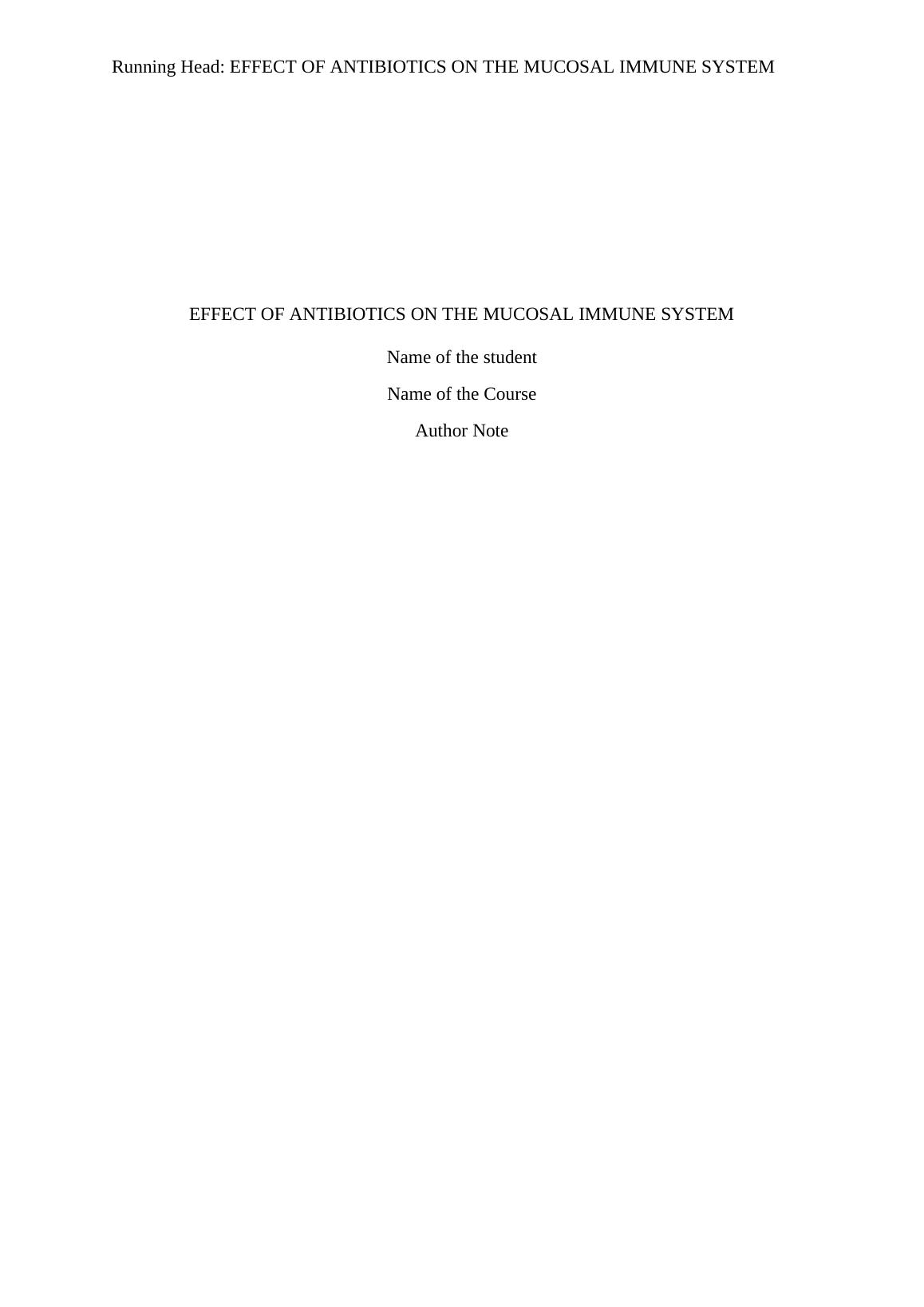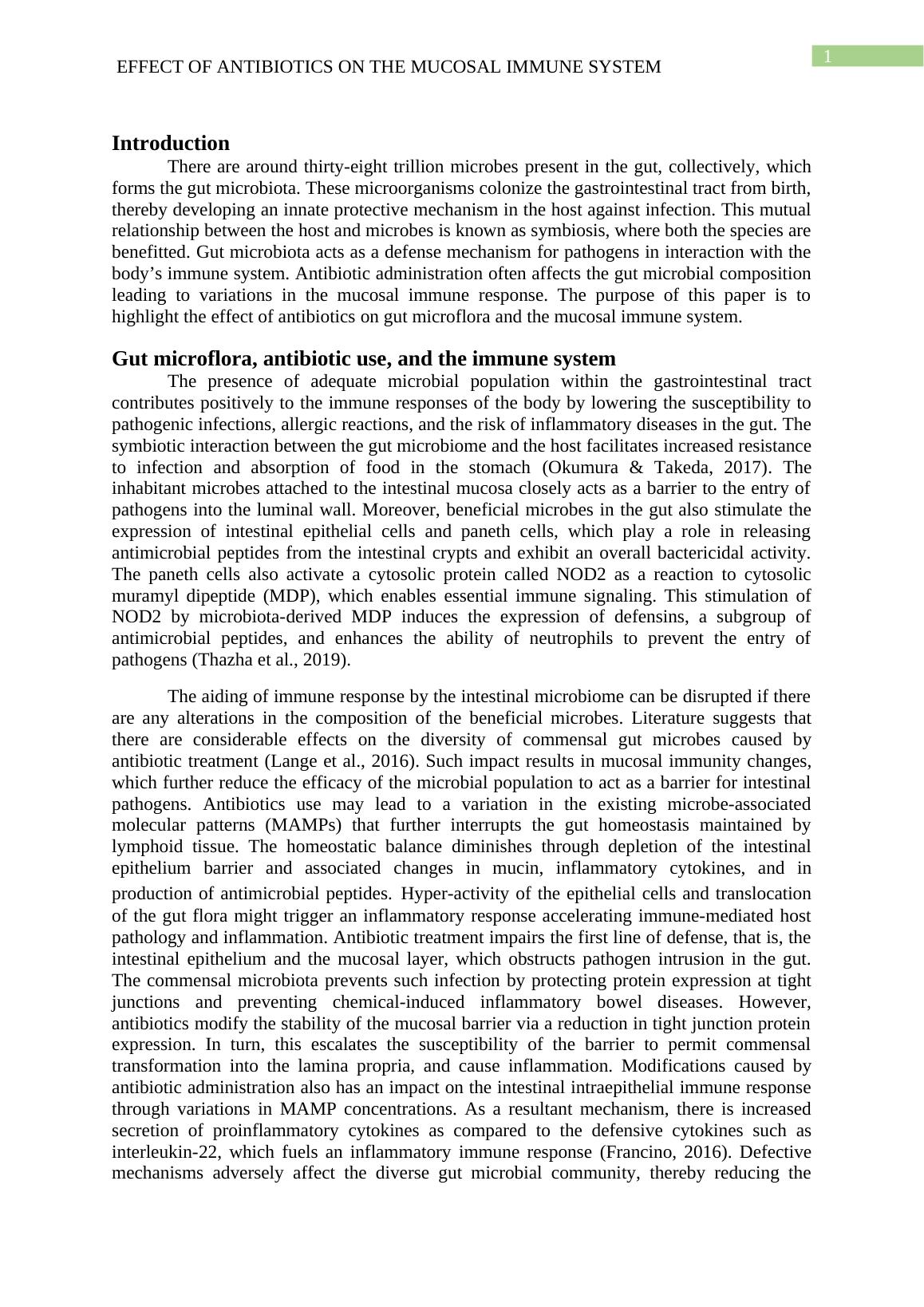Effect of Antibiotics on the Mucosal Immune System.
Added on 2022-08-28
4 Pages1115 Words23 Views
Running Head: EFFECT OF ANTIBIOTICS ON THE MUCOSAL IMMUNE SYSTEM
EFFECT OF ANTIBIOTICS ON THE MUCOSAL IMMUNE SYSTEM
Name of the student
Name of the Course
Author Note
EFFECT OF ANTIBIOTICS ON THE MUCOSAL IMMUNE SYSTEM
Name of the student
Name of the Course
Author Note

1
EFFECT OF ANTIBIOTICS ON THE MUCOSAL IMMUNE SYSTEM
Introduction
There are around thirty-eight trillion microbes present in the gut, collectively, which
forms the gut microbiota. These microorganisms colonize the gastrointestinal tract from birth,
thereby developing an innate protective mechanism in the host against infection. This mutual
relationship between the host and microbes is known as symbiosis, where both the species are
benefitted. Gut microbiota acts as a defense mechanism for pathogens in interaction with the
body’s immune system. Antibiotic administration often affects the gut microbial composition
leading to variations in the mucosal immune response. The purpose of this paper is to
highlight the effect of antibiotics on gut microflora and the mucosal immune system.
Gut microflora, antibiotic use, and the immune system
The presence of adequate microbial population within the gastrointestinal tract
contributes positively to the immune responses of the body by lowering the susceptibility to
pathogenic infections, allergic reactions, and the risk of inflammatory diseases in the gut. The
symbiotic interaction between the gut microbiome and the host facilitates increased resistance
to infection and absorption of food in the stomach (Okumura & Takeda, 2017). The
inhabitant microbes attached to the intestinal mucosa closely acts as a barrier to the entry of
pathogens into the luminal wall. Moreover, beneficial microbes in the gut also stimulate the
expression of intestinal epithelial cells and paneth cells, which play a role in releasing
antimicrobial peptides from the intestinal crypts and exhibit an overall bactericidal activity.
The paneth cells also activate a cytosolic protein called NOD2 as a reaction to cytosolic
muramyl dipeptide (MDP), which enables essential immune signaling. This stimulation of
NOD2 by microbiota-derived MDP induces the expression of defensins, a subgroup of
antimicrobial peptides, and enhances the ability of neutrophils to prevent the entry of
pathogens (Thazha et al., 2019).
The aiding of immune response by the intestinal microbiome can be disrupted if there
are any alterations in the composition of the beneficial microbes. Literature suggests that
there are considerable effects on the diversity of commensal gut microbes caused by
antibiotic treatment (Lange et al., 2016). Such impact results in mucosal immunity changes,
which further reduce the efficacy of the microbial population to act as a barrier for intestinal
pathogens. Antibiotics use may lead to a variation in the existing microbe-associated
molecular patterns (MAMPs) that further interrupts the gut homeostasis maintained by
lymphoid tissue. The homeostatic balance diminishes through depletion of the intestinal
epithelium barrier and associated changes in mucin, inflammatory cytokines, and in
production of antimicrobial peptides. Hyper-activity of the epithelial cells and translocation
of the gut flora might trigger an inflammatory response accelerating immune-mediated host
pathology and inflammation. Antibiotic treatment impairs the first line of defense, that is, the
intestinal epithelium and the mucosal layer, which obstructs pathogen intrusion in the gut.
The commensal microbiota prevents such infection by protecting protein expression at tight
junctions and preventing chemical-induced inflammatory bowel diseases. However,
antibiotics modify the stability of the mucosal barrier via a reduction in tight junction protein
expression. In turn, this escalates the susceptibility of the barrier to permit commensal
transformation into the lamina propria, and cause inflammation. Modifications caused by
antibiotic administration also has an impact on the intestinal intraepithelial immune response
through variations in MAMP concentrations. As a resultant mechanism, there is increased
secretion of proinflammatory cytokines as compared to the defensive cytokines such as
interleukin-22, which fuels an inflammatory immune response (Francino, 2016). Defective
mechanisms adversely affect the diverse gut microbial community, thereby reducing the
EFFECT OF ANTIBIOTICS ON THE MUCOSAL IMMUNE SYSTEM
Introduction
There are around thirty-eight trillion microbes present in the gut, collectively, which
forms the gut microbiota. These microorganisms colonize the gastrointestinal tract from birth,
thereby developing an innate protective mechanism in the host against infection. This mutual
relationship between the host and microbes is known as symbiosis, where both the species are
benefitted. Gut microbiota acts as a defense mechanism for pathogens in interaction with the
body’s immune system. Antibiotic administration often affects the gut microbial composition
leading to variations in the mucosal immune response. The purpose of this paper is to
highlight the effect of antibiotics on gut microflora and the mucosal immune system.
Gut microflora, antibiotic use, and the immune system
The presence of adequate microbial population within the gastrointestinal tract
contributes positively to the immune responses of the body by lowering the susceptibility to
pathogenic infections, allergic reactions, and the risk of inflammatory diseases in the gut. The
symbiotic interaction between the gut microbiome and the host facilitates increased resistance
to infection and absorption of food in the stomach (Okumura & Takeda, 2017). The
inhabitant microbes attached to the intestinal mucosa closely acts as a barrier to the entry of
pathogens into the luminal wall. Moreover, beneficial microbes in the gut also stimulate the
expression of intestinal epithelial cells and paneth cells, which play a role in releasing
antimicrobial peptides from the intestinal crypts and exhibit an overall bactericidal activity.
The paneth cells also activate a cytosolic protein called NOD2 as a reaction to cytosolic
muramyl dipeptide (MDP), which enables essential immune signaling. This stimulation of
NOD2 by microbiota-derived MDP induces the expression of defensins, a subgroup of
antimicrobial peptides, and enhances the ability of neutrophils to prevent the entry of
pathogens (Thazha et al., 2019).
The aiding of immune response by the intestinal microbiome can be disrupted if there
are any alterations in the composition of the beneficial microbes. Literature suggests that
there are considerable effects on the diversity of commensal gut microbes caused by
antibiotic treatment (Lange et al., 2016). Such impact results in mucosal immunity changes,
which further reduce the efficacy of the microbial population to act as a barrier for intestinal
pathogens. Antibiotics use may lead to a variation in the existing microbe-associated
molecular patterns (MAMPs) that further interrupts the gut homeostasis maintained by
lymphoid tissue. The homeostatic balance diminishes through depletion of the intestinal
epithelium barrier and associated changes in mucin, inflammatory cytokines, and in
production of antimicrobial peptides. Hyper-activity of the epithelial cells and translocation
of the gut flora might trigger an inflammatory response accelerating immune-mediated host
pathology and inflammation. Antibiotic treatment impairs the first line of defense, that is, the
intestinal epithelium and the mucosal layer, which obstructs pathogen intrusion in the gut.
The commensal microbiota prevents such infection by protecting protein expression at tight
junctions and preventing chemical-induced inflammatory bowel diseases. However,
antibiotics modify the stability of the mucosal barrier via a reduction in tight junction protein
expression. In turn, this escalates the susceptibility of the barrier to permit commensal
transformation into the lamina propria, and cause inflammation. Modifications caused by
antibiotic administration also has an impact on the intestinal intraepithelial immune response
through variations in MAMP concentrations. As a resultant mechanism, there is increased
secretion of proinflammatory cytokines as compared to the defensive cytokines such as
interleukin-22, which fuels an inflammatory immune response (Francino, 2016). Defective
mechanisms adversely affect the diverse gut microbial community, thereby reducing the

End of preview
Want to access all the pages? Upload your documents or become a member.
Related Documents
Implication of Human Microbiota on the Gut Inflammatory Diseaseslg...
|15
|3260
|483
Crohn’s Disease: Etiology, Incidence, Precipitating Factors, Complications, Prognosis, Iatrogenic, Sequalaelg...
|7
|1740
|51
Campylobacter Jejuni: A Brief Overview on Pathogenicity-Associated Factors and Disease-Mediating Mechanismslg...
|9
|2535
|175
